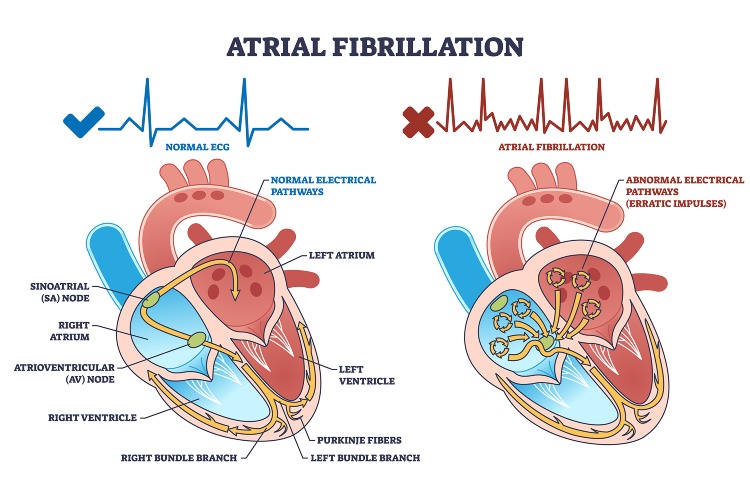Living with Atrial Fibrillation: Lifestyle Adjustments and Management Tips

Atrial Fibrillation: Lifestyle Changes and Management Tips
Atrial fibrillation (AFib) is a common heart condition that affects millions of people worldwide, characterized by an irregular and often rapid heart rate. While there’s no cure for AFib, managing it with lifestyle changes and medical treatments can greatly improve your quality of life. Explore how to live well with AFib by adopting heart-healthy habits and working closely with your healthcare team.
What is Atrial Fibrillation?
Atrial fibrillation occurs when the upper chambers of the heart (the atria) beat irregularly and out of sync with the lower chambers (ventricles). This disrupts blood flow through the heart, leading to symptoms like heart palpitations, shortness of breath, and fatigue. For some, AFib is episodic, known as paroxysmal atrial fibrillation, while others experience it persistently or permanently.

Complications of Atrial Fibrillation
Although AFib is not immediately life-threatening, it increases the risk of stroke and heart failure if not treated or managed properly. AFib causes blood to pool in the heart’s chambers, increasing the likelihood of blood clots. These clots can travel to the brain, causing a stroke. In fact, people with AFib are five times more likely to have a stroke than those without the condition. Heart failure is also a concern. Over time, the irregular heartbeats associated with AFib weaken the heart muscle, preventing it from pumping blood effectively.
Heart-Friendly Lifestyle Adjustments for Living with AFib
Your lifestyle plays an important part in controlling AFib. Adopting heart-healthy habits can help you manage symptoms and lower your risk of complications. Work with your doctor to incorporate the following atrial fibrillation lifestyle changes into your daily routine.
• Prioritize a Heart-Healthy Diet
A balanced diet is crucial for managing AFib. Focus on heart-friendly foods like fruits and vegetables, whole grains, and healthy fats. At the same time, limit your intake of salt, sugar, alcohol, and caffeine, which are known to trigger AFib symptoms.
• Exercise Regularly but Safely
Physical activity is important for heart health, even while living with AFib. Moderate exercise, such as walking, swimming, or cycling, improves cardiovascular fitness and helps your heart work properly. However, it’s essential to exercise within your limits. Avoid pushing yourself too hard, especially during AFib episodes.
- Aim for 150 minutes of moderate-intensity exercise per week, but only work out when your heart rhythm feels stable. Your cardiologist can help you determine your target heart rate based on your age and medications. Stop exercising and consult your healthcare provider if you experience chest pain, dizziness, or extreme fatigue.
• Quit Smoking
The nicotine in cigarettes damages blood vessels and the heart, worsening AFib symptoms and increasing the risk of heart disease. If you currently smoke, quitting is the best step you can take to improve your heart health. Ask your doctor to recommend a cessation method they think will work best for you.
• Stay Hydrated
Dehydration affects your heart’s ability to maintain a regular rhythm, so drink plenty of water throughout the day. Speak to your doctor about your personal hydration needs, especially if you’re taking diuretics for other heart conditions.
• Manage Stress
Stress can trigger AFib episodes, making it crucial to manage anxiety and other mental health conditions. Activities like yoga, meditation, massage, and deep breathing exercises help reduce stress. Also, aim for a healthy work-life balance and seek support from friends and family.
• Monitor Your Triggers
Many people with AFib find that certain habits or foods trigger their symptoms. Common culprits include spicy food, lack of sleep, dehydration, and emotional stress. Keep track of your episodes in a journal to identify patterns and help you avoid your personal triggers.
• Medication Management
AFib often requires medication to control the heart rate and reduce the risk of stroke. Common medications include blood thinners, beta-blockers, and calcium channel blockers. Take your medication exactly as prescribed, and consult your doctor if you experience side effects.
Working with Your Healthcare Team
Managing AFib in your daily life involves regular checkups with your healthcare provider to monitor the condition and adjust treatments as needed. In addition to the AFib health tips above, your care team may recommend electrical cardioversion, a procedure to restore normal heart rhythm, or catheter ablation, a minimally invasive procedure to treat abnormal electrical signals in the heart. Pacemakers are also sometimes used if AFib cannot be controlled with other treatments.
Cardiovascular Specialists of New England is on a mission to redefine heart health and elevate the lives of patients with cardiovascular conditions like atrial fibrillation. Our team of experienced cardiologists, including two specialists in women’s heart health, provides fast access to innovative, minimally invasive treatments that help you manage your condition. If you’re in New Hampshire and need personalized heart care, call us today to schedule an appointment.
Stay Tuned! More information coming soon!
